“How important is religion in your life?” and “What is your current religion?” are two survey questions that have long been used to measure religiousness in individuals and societies.
By these benchmarks, the world’s most religious countries are mostly in the Middle East, South and Southeast Asia, sub-Saharan Africa and Latin America. For example, about nine-in-ten adults in Kenya and Sri Lanka say religion is very important in their lives, and virtually all adults in both places identify with a religion.
Meanwhile, societies in Europe, East Asia, Australia and Canada tend to show lower levels of religiousness. In Japan, for instance, fewer than half of adults (44%) identify with a religion, and just 7% say religion is very important to them.
In general, younger adults (people ages 18 to 34) are less likely than the oldest adults we surveyed (ages 50 and older) to say religion is very important in their lives. Likewise, younger adults are less likely to identify with any religion.
In many of the places we surveyed, people with less education are more likely than others to say that religion is very important in their lives and to identify with a religion.
There also is a gender gap on these questions in some countries, with women more likely than men to say religion is very important to them personally. In some places, women also are more likely than men to be religiously affiliated.
Jump to more on: Personal importance of religion | Religious affiliation
How important is religion in your life?
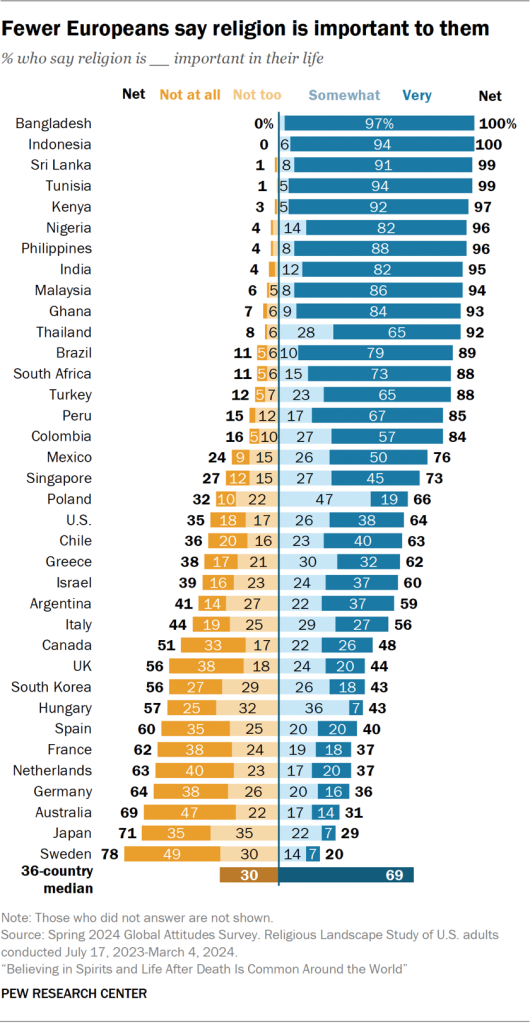
In a dozen of the 36 countries surveyed, about three-quarters or more of adults say religion is very important in their lives. People who live in South and Southeast Asia, as well as in Africa, are among the most likely to feel this way. In Bangladesh, for example, nearly everyone we surveyed (97%) said religion is very important to them.
At the same time, there also are roughly a dozen countries where only about one-quarter or fewer of adults say religion is very important in their lives. Many of these countries are in Europe and East Asia. For example, just 18% of French and South Korean adults ascribe a lot of personal importance to religion.
The United States, Israel and Argentina fall roughly in the middle of the countries surveyed: 38% of Americans say religion is very important in their lives, as do 37% of both Israelis and Argentinians.
Views by religion
Muslims are consistently among the most likely to say religion is very important in their lives. In every country with a sample of Muslims large enough to analyze separately, at least half of Muslims say religion is very important to them. In many of these places, nine-in-ten or more Muslims express that sentiment.
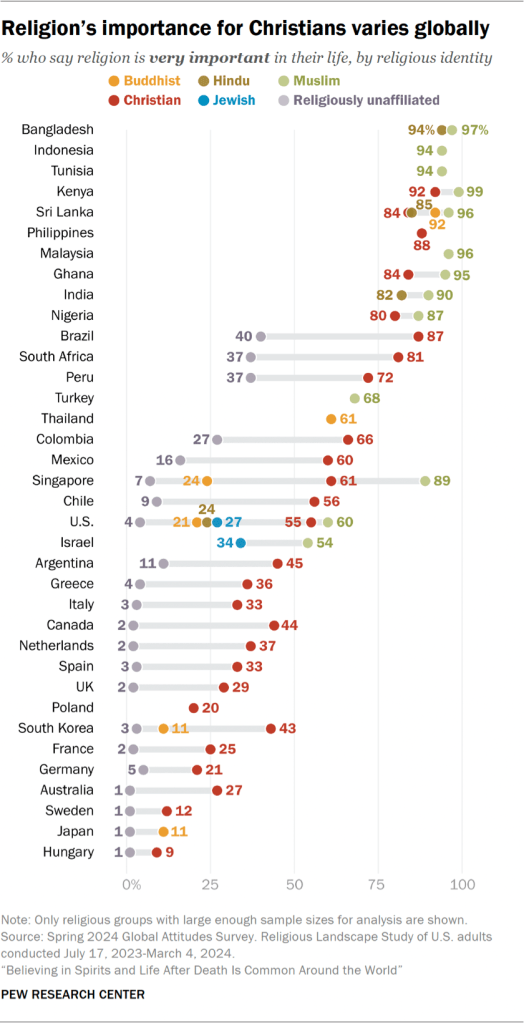
Large shares of Hindus also tend to say religion is personally very important. In India, for instance, 82% of Hindus say this. However, Hindu Americans (24%) are much less likely than Hindus living in India, Bangladesh and Sri Lanka to place a lot of importance on religion. These are the only countries with enough Hindu respondents to break out their views separately.
In general, the share of Christians who say religion is very important in their lives also ranges widely around the world. In a few countries, the vast majority of Christians say religion is very important in their lives; this includes Christians in Kenya (92%), the Philippines (88%) and Brazil (87%). Much smaller majorities feel the same in Chile (56%) and the U.S. (55%). And in Sweden (12%) and Hungary (9%), relatively few Christians view religion as personally very important.
Religiously unaffiliated adults – people who describe themselves as atheist, agnostic or “nothing in particular” when asked about their religion – are consistently the least likely in each country to say religion is very important in their lives. In most places, 5% or fewer of the religiously unaffiliated population feels this way. For example, in Italy, only 3% of unaffiliated adults say this.
Still, in four countries – Brazil, Colombia, Peru and South Africa – at least a quarter of religiously unaffiliated adults say religion is personally very important to them.
Views by gender
In general, women are somewhat more likely than men to say that religion is very important in their lives.
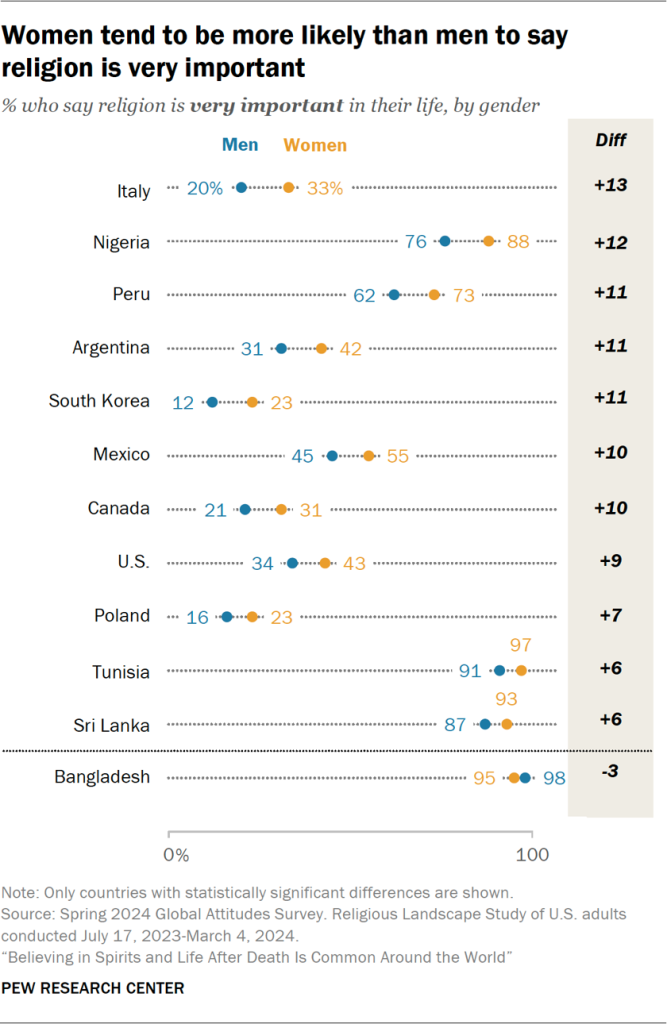
For example, one-third of Italian women see religion as personally very important, compared with 20% of Italian men.
And, in Sri Lanka, women are slightly more likely than men to hold this view (93% vs. 87%).
Bangladesh is the only country in the survey where men are more likely than women to say religion is very important in their lives (98% vs. 95%).
This general pattern echoes our previous research on the gender gap in religion around the world.
Views by education
In most countries surveyed, people who have more education are less likely than other adults to say religion is very important to them.
In Greece, for example, 20% of adults who have completed schooling beyond a secondary education say religion is very important in their lives. Meanwhile, 36% of Greeks with less schooling feel this way about religion.
(Secondary education is equivalent to high school in the U.S.)
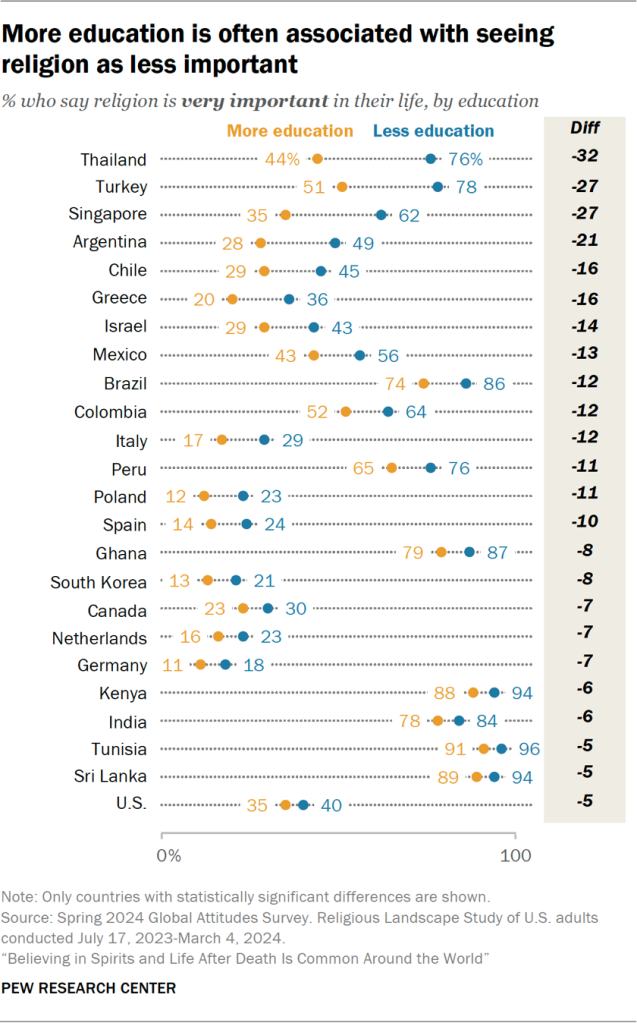
Religious affiliation
In nearly every country surveyed, having a religion is more common than not having one.
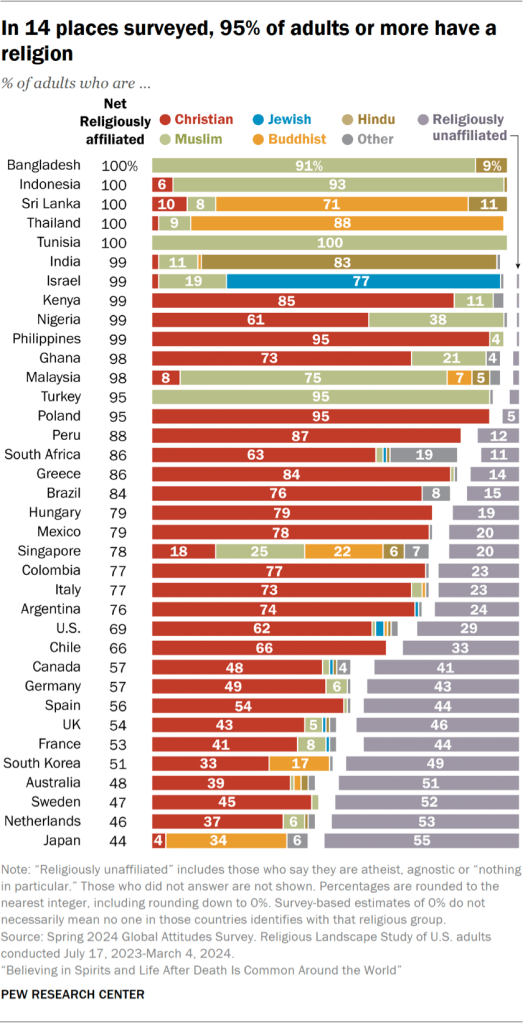
And in 14 countries, religious affiliation is almost universal, with 95% or more of adults saying they identify with a religion.
These countries tend to have clear religious majorities. For instance, most people in Bangladesh identify as Muslims, most in Sri Lanka identify as Buddhists, and most Indians are Hindus. Likewise, nearly eight-in-ten Israelis are Jewish, and almost all Filipinos are Christian.
Countries with high affiliation rates are concentrated in South and Southeast Asia, Africa and the Middle East.
On the other hand, countries with substantial shares of religiously unaffiliated people are mostly in Europe, East Asia and the Americas.
In countries with large unaffiliated populations, Christians often make up the largest affiliated group.
However, there are some exceptions. In Singapore, a quarter of adults are Muslim, and nearly a quarter are Buddhist. Buddhists also make up significant portions of the Japanese and South Korean populations. And in South Africa, nearly one-in-five adults fall in the “other religions” category, including many who follow traditional African and ancestral religions, such as Zulu or San beliefs.3
For more on religious identity in the U.S., read “Decline of Christianity in the U.S. Has Slowed, May Have Leveled Off.”
For information on how people’s religious identities have changed within their lifetimes, including how people who have switched out of Christianity have boosted the ranks of the religiously unaffiliated in many countries, read “Around the World, Many People Are Leaving Their Childhood Religions.”
Differences in affiliation by education
In quite a few of the countries surveyed, adults who have more education are less likely to be religiously affiliated.
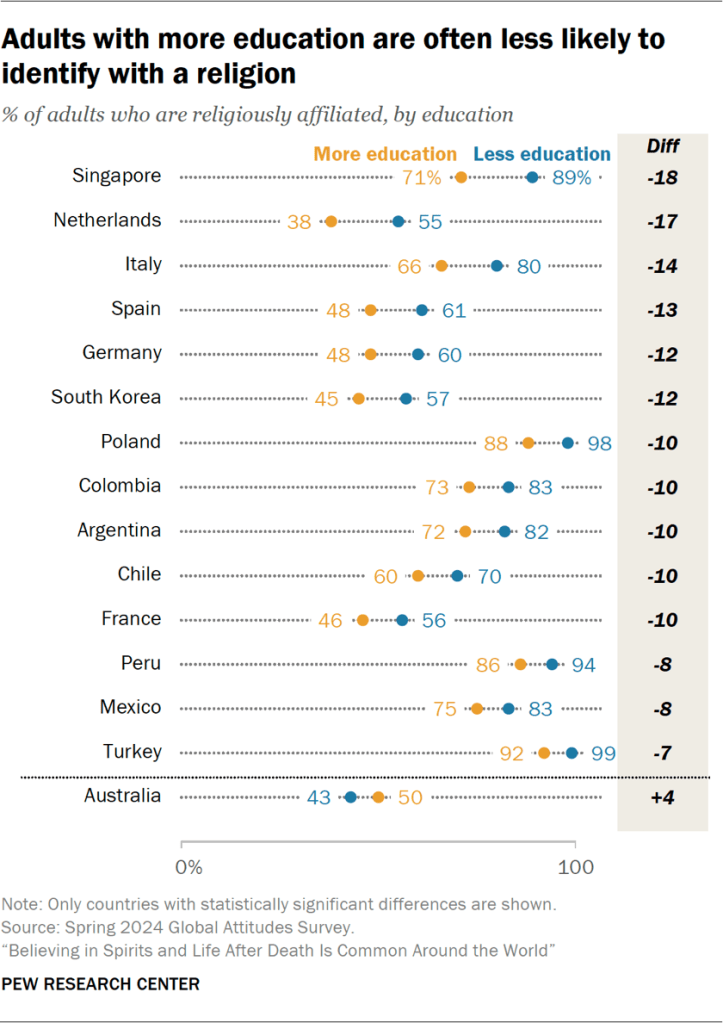
In Italy, for instance, 66% of adults with schooling beyond a secondary education have a religion, compared with 80% of adults with a secondary education or less.
Only in Australia do we see the opposite: People with more education are slightly more likely than others to have a religion.
The negative relationship between education and religious affiliation mostly exists in countries where Christianity has historically been the majority religion. However, Singapore, South Korea and Turkey also show this pattern.
Differences in affiliation by age
In nearly two dozen of the surveyed countries, older adults (ages 50 and older) are at least somewhat more likely than the youngest adults (ages 18 to 34) to identify with a religion.
Just over half of older Japanese have a religion, for example, but only one-quarter of Japanese adults under 35 have one.
And in the U.S., 80% of older Americans are religiously affiliated, while 55% of the youngest U.S. adults identify with a religion.
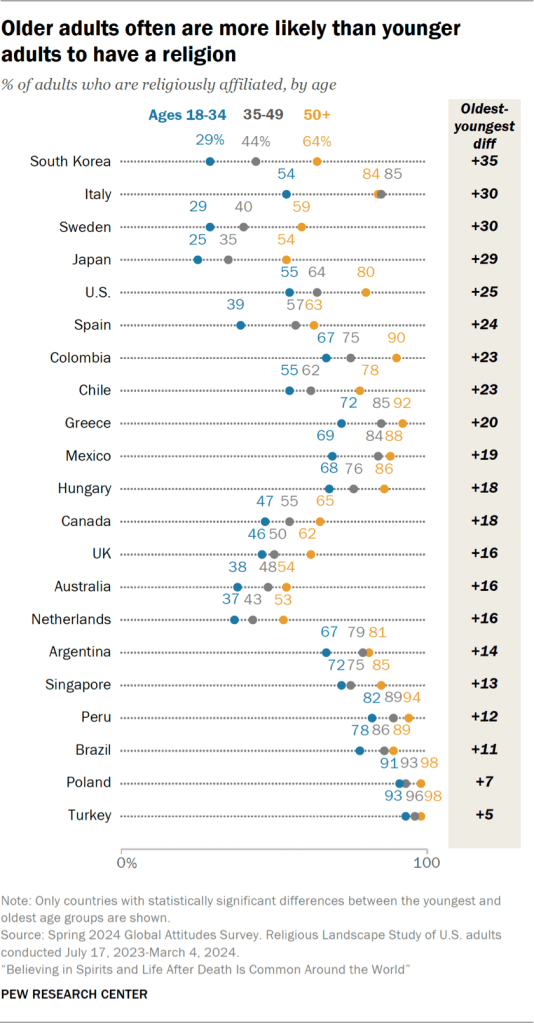
Differences in affiliation by gender
In nine of the countries surveyed, women are more likely than men to be religiously affiliated. For instance, a majority of South Korean women have a religion (59%), compared with 44% of men in the country.
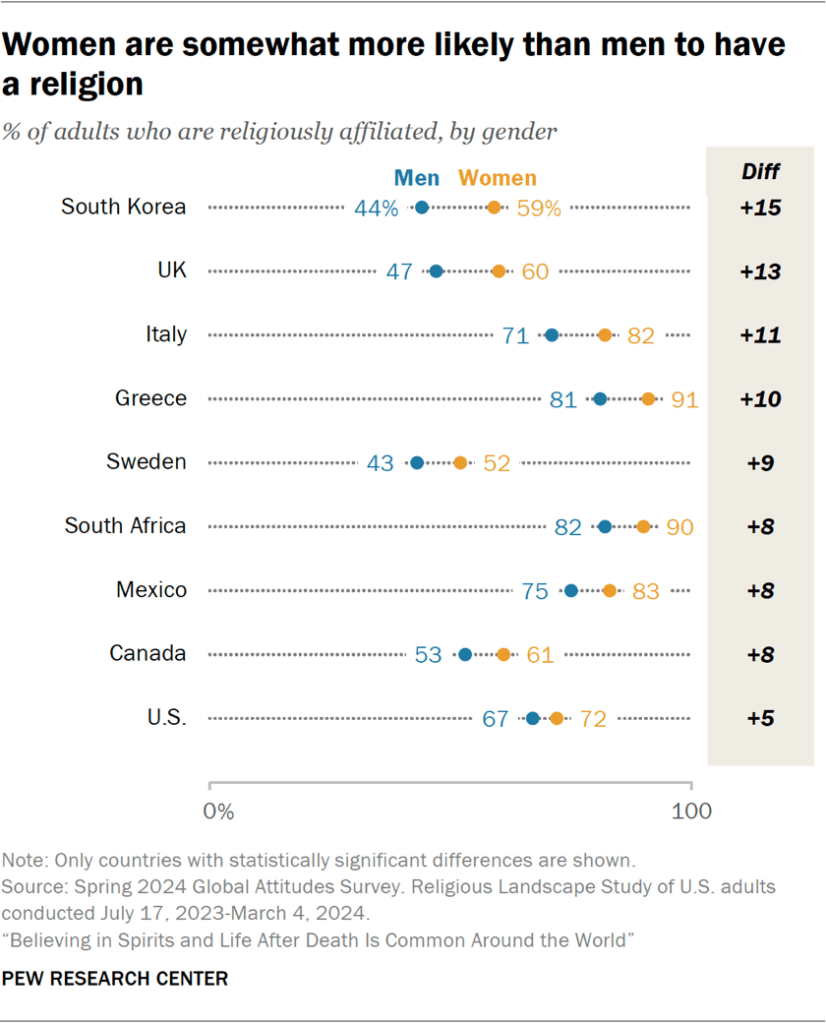
Women in the U.S. also are slightly more likely than men to say they have a religion (72% vs. 67%).




